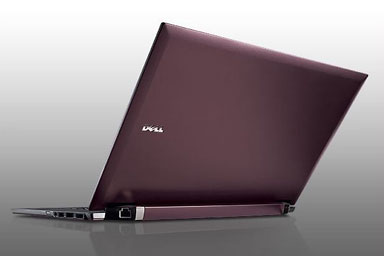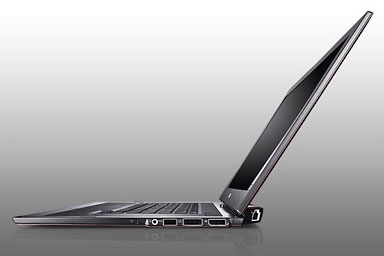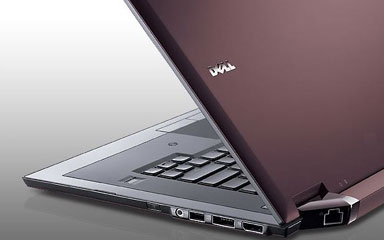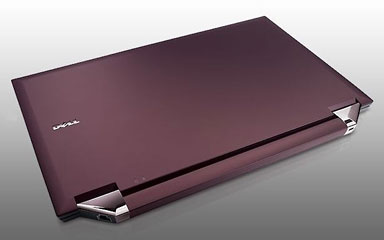DPMac's
George Mann comments that for three years now, Mac laptop
power-users who travel a lot have been pining for Apple to build a
MacBook Pro version of the 12" PowerBook
G4.
Well, maybe someday they will, but I'm doubtful, being of a mind
since last October (yikes! - the Unibody 'Books are almost a year old
already) that the original 13" Unibody MacBook, and now
even more so the 13" MacBook Pro, are
as close as Apple is likely to come to making an an Intel analog of the
much-admired 12" PowerBook.
Some folks continue to insist that the 13" Unibody is still just a
wee bit too heavy and bulky to be a totally satisfactory substitute,
while the MacBook Air is
too feature, expansion, and connectivity compromised to take seriously
as a power-user's tool.
So Mann asks rhetorically: "When will there be a new power user
version of a sub-notebook computer available from Apple?"
Like I said, the 13" Unibody is probably it, although I've seen the
odd rumor that there might be a 12" version of the anticipated, slimmed-down,
and lightened replacement for the white entry-level MacBook, which
seems more plausible than a 12" unibody aluminum jobbie.
That, however, won't be a satisfactory solution for George, who
thinks such a machine still wouldn't be the compact road warrior that
IT consultants, engineers, musicians, journalists, photographers, and
other heavy duty traveling professionals are looking for. He argues
(and I agree) that folks who use their 'Books as serious tools need all
the processing power, ports, and networking hardware of the MacBook
Pro, just in a smaller package, but my expectation remains that the 13"
MacBook Pro is as close to that package as we're likely to get - in the
near to mid-term anyway - and as a satisfied owner of a Unibody
MacBook, I think that's not a bad thing.
With an Apple tablet computer almost certainly coming, and probably
a more svelte polycarbonate MacBook as well, plus the existing 13"
MacBook Pro and MacBook Air, it's going to get mighty crowded in
Apple's smallish notebook orchard, so the odds of them building a 12"
MacBook Pro are pretty much slim to nil.
MacBooks for Business?
 Speaking of
professional-grade Mac laptops, Forbes'
Brian Caulfield last week posted a screed observing that while
Apple makes great laptops, it still lags sadly behind in its
penetration of the enterprise market. Caulfield cites Dell's new 16"
light and slim Latitude Z
business laptop as an example of Dell addressing that market in ways
that Apple - which he contends is as clueless about big business as
Dell is about digital music players - doesn't even try to.
Speaking of
professional-grade Mac laptops, Forbes'
Brian Caulfield last week posted a screed observing that while
Apple makes great laptops, it still lags sadly behind in its
penetration of the enterprise market. Caulfield cites Dell's new 16"
light and slim Latitude Z
business laptop as an example of Dell addressing that market in ways
that Apple - which he contends is as clueless about big business as
Dell is about digital music players - doesn't even try to.
I think his point is valid.
First, it's pretty hard to argue with Caulfield's contention, since
(based on IDC data) Dell enjoys some 32% of the market in computers
sold to companies with more than 500 employees, with HP taking another
25% of that market, followed by Lenovo, Acer, and Toshiba, with Apple
bringing up the rear. Caulfield notes that the Latitude Z is available
with a raft of features and options that make corporate IT departments
go all weak in the knees, like an optional fingerprint reader and a
contactless smart card reader - bells and whistles that
security-oriented business organizations such as financial institutions
place a high premium on - and neither available with any MacBook, to
say nothing of Dell's FaceAware! Lock-Out feature that automatically
locks out other users when the authorized user steps away from the
computer.
 The Dell
Latitude Z is undeniably an attractive piece of work, at least on
paper, being among many other things the first laptop to be marketed
with wireless docking and inductive charging, a topic that would be
fodder for an entire column in itself. This is one of those PC machines
that, like Acer's Ferrari series laptops, makes me reconsider my total
loyalty to the Mac.
The Dell
Latitude Z is undeniably an attractive piece of work, at least on
paper, being among many other things the first laptop to be marketed
with wireless docking and inductive charging, a topic that would be
fodder for an entire column in itself. This is one of those PC machines
that, like Acer's Ferrari series laptops, makes me reconsider my total
loyalty to the Mac.
Targeted at high-end enterprise and professional users - such as
entrepreneurs, lawyers, creative professionals, salespeople and higher
education faculty - and priced the same as the middle-model 15.4"
MacBook Pro, this 16" laptop (a display size Apple has never used)
measures less than an inch thick and weighs in at 4.5 pounds - roughly
the same as a 13" MacBook Pro.
 Under the
hood, the Latitude Z features Intel Core 2 Duo power, albeit
lighter-duty than any MacBook Pro, with either 1.6 GHz and 4 GB RAM or
1.4 GHz with 2 GB RAM. A variety of hard drive and SSD options are
offered, along with the sensible solution of an external optical drive
with optional external eSATA Slot-load DVD-RW or Blu-ray drives. There
are two USB 2.0 ports (one shared with an eSATA port - something else
you can't get on any MacBook), DisplayPort video out, an RJ-45 ethernet
port, and a headphone/headset connector.
Under the
hood, the Latitude Z features Intel Core 2 Duo power, albeit
lighter-duty than any MacBook Pro, with either 1.6 GHz and 4 GB RAM or
1.4 GHz with 2 GB RAM. A variety of hard drive and SSD options are
offered, along with the sensible solution of an external optical drive
with optional external eSATA Slot-load DVD-RW or Blu-ray drives. There
are two USB 2.0 ports (one shared with an eSATA port - something else
you can't get on any MacBook), DisplayPort video out, an RJ-45 ethernet
port, and a headphone/headset connector.
Dell's EdgeTouch feature dips the Latitude Z's proverbial toe in the
touchscreen control waters, enabling users to interact with
commonly-used applications and media controls through a touch interface
on the display screen's bezel, plus there are a multi-touch trackpad
and backlit keyboard.
 The display
itself is a 16" high-definition (1600 x 900) WLED unit, and the
Latitude Z also has a 2.0 megapixel webcam featuring Dell's
enterprise-friendly Capture technology that allows users to scan and
save business cards to Microsoft Outlook contacts and copy
documents.
The display
itself is a 16" high-definition (1600 x 900) WLED unit, and the
Latitude Z also has a 2.0 megapixel webcam featuring Dell's
enterprise-friendly Capture technology that allows users to scan and
save business cards to Microsoft Outlook contacts and copy
documents.
Personally, I think the Black Cherry finish is enormously
attractive, being a fancier of burgundy red shades, and I would rate
this Latitude Z better looking than any of Apple's laptop offerings - a
subjective evaluation, of course, and I'm sure some will disagree. I
love the look of my Unibody MacBook, but Apple needs more color
variety, and this Dell is one seductively fetching laptop, IMHO.
In addition to the features listed above, the Latitude Z is
available with WLAN, Bluetooth, and optional 3G WWAN mobile broadband,
plus a feature called Latitude ON, which Dell says represents the
convergence of laptop productivity with instant on convenience and
multi-day battery life in idle mode.
Latitude ON includes a sub-processor and sub-operating system that
delivers instant, interactive access to email, the Web, contacts,
attachments, and calendars, allowing users to stay connected with
access to IMAP, POP, Novell GroupWise, or Microsoft Exchange 2003
email, Citrix Receiver that allows IT administrators to ensure remote
secure access similar to a thin client, strong password requirement,
supports for virtual private network (VPN) functionality, and the
ability to read .doc, .xls, .ppt and .pdf documents.
I anticipate that Dell is going to sell a ton for these.
The Latitude Z is available now in the US and Canada starting at
US$1,999 as well as in select countries in Europe and Asia.

 Speaking of
professional-grade Mac laptops, Forbes'
Speaking of
professional-grade Mac laptops, Forbes'  The Dell
Latitude Z is undeniably an attractive piece of work, at least on
paper, being among many other things the first laptop to be marketed
with wireless docking and inductive charging, a topic that would be
fodder for an entire column in itself. This is one of those PC machines
that, like Acer's Ferrari series laptops, makes me reconsider my total
loyalty to the Mac.
The Dell
Latitude Z is undeniably an attractive piece of work, at least on
paper, being among many other things the first laptop to be marketed
with wireless docking and inductive charging, a topic that would be
fodder for an entire column in itself. This is one of those PC machines
that, like Acer's Ferrari series laptops, makes me reconsider my total
loyalty to the Mac. Under the
hood, the Latitude Z features Intel Core 2 Duo power, albeit
lighter-duty than any MacBook Pro, with either 1.6 GHz and 4 GB RAM or
1.4 GHz with 2 GB RAM. A variety of hard drive and SSD options are
offered, along with the sensible solution of an external optical drive
with optional external eSATA Slot-load DVD-RW or
Under the
hood, the Latitude Z features Intel Core 2 Duo power, albeit
lighter-duty than any MacBook Pro, with either 1.6 GHz and 4 GB RAM or
1.4 GHz with 2 GB RAM. A variety of hard drive and SSD options are
offered, along with the sensible solution of an external optical drive
with optional external eSATA Slot-load DVD-RW or  The display
itself is a 16" high-definition (1600 x 900) WLED unit, and the
Latitude Z also has a 2.0 megapixel webcam featuring Dell's
enterprise-friendly Capture technology that allows users to scan and
save business cards to Microsoft Outlook contacts and copy
documents.
The display
itself is a 16" high-definition (1600 x 900) WLED unit, and the
Latitude Z also has a 2.0 megapixel webcam featuring Dell's
enterprise-friendly Capture technology that allows users to scan and
save business cards to Microsoft Outlook contacts and copy
documents.
